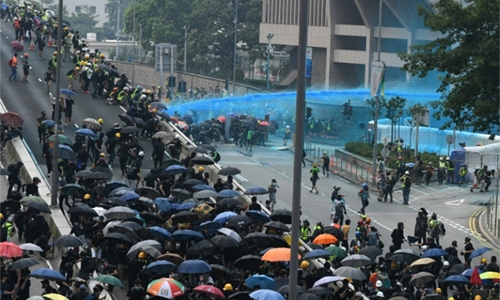Intense clashes ahead of China’s anniversary
Fierce clashes broke out between protesters and riot police in Hong Kong yesterday as thousands marched through the strife-torn city, during a day of global protests aimed at casting a shadow over communist China’s upcoming 70th birthday. Beijing is preparing for huge, tightly-choreographed festivities from Tuesday to mark the founding of the People’s Republic of China, including a huge military parade that will revel in the country’s emergence as a global superpower.
But ongoing unrest in Hong Kong threatens to upstage those celebrations as the semi-autonomous city boils with public anger over the erosion of its special freedoms under Beijing’s rule. Democracy activists in the financial hub had vowed to ramp up their nearly four-month-long campaign ahead of Tuesday’s National Day celebrations, which Hong Kong protesters have dubbed a “Day of Grief”. Yesterday witnessed the most intense clashes in weeks as police used tear gas, rubber bullets and water cannons at multiple locations during running battles with hardcore protesters hurling rocks and petrol bombs.
Using online forums and social media, protesters had called for “anti-totalitarian” rallies to be held around the globe. Marches were held in Australia and Taiwan, with more planned in some 40 locations across Europe and North America later in the day. Clashes broke out before Hong Kong’s unsanctioned march had begun after angry crowds in the shopping district of Causeway Bay surrounded and heckled officers who were conducting stop and searches. But the tear gas fired by police only emboldened the crowds who then began walking through the streets in their thousands.
Running battles
Some hardcore activists vandalised subway stations, tore down banners proclaiming the upcoming 70th anniversary celebrations and set fire to makeshift barricades. Many marchers were holding so-called “Chinazi flags”, a version of the Chinese flag with yellow stars arranged in the shape of a swastika. Police spent hours firing tear gas and rubber bullets at different locations across the city centre and were seen making multiple arrests throughout the day.
A reporter witnessed masked men repeatedly beating pro-democracy protesters in the district of Wanchai using long sticks. It was not clear if the men were police dressed as protesters, a tactic used by the force with increased frequency. A member of the media was also attended to by volunteer medics after being hit in the face with a police projectile. Hong Kong’s protesters have stepped up their international lobbying in recent weeks. A 20-year-old student, who gave his first name as Tony, was waving a Ukrainian flag.
Many of Hong Kong’s more hardcore protesters have taken inspiration from the 2014 Ukrainian Revolution which ousted a pro-Russian president. “We are hoping that if we connect to different parts of the world and fight against Chinese communism, we will win this movement,” he said. A 62-year-old protester, who gave his surname as Man, said he felt people’s livelihoods and freedoms had deteriorated since Hong Kong was handed back to China by Britain in 1997.
“I don’t want to topple the regime, but it definitely needs to changed,” he told AFP. “It needs to seek a reconciliation with the people.”
Months of unrest
Over the last 17 weeks, Hong Kong has witnessed the worst political unrest since its handover to China in 1997 with huge pro-democracy rallies as well as increasingly intense clashes between police and a minority of violent protesters. The city’s summer of discontent was first triggered by an extradition bill to the mainland that has now been shelved. But the movement has since morphed into a call for free elections and less intervention from Beijing.
On Friday and Saturday night, tens of thousands of people turned out for two peaceful rallies. But there were brief clashes on Saturday night when police used water cannon and tear gas to beat back small groups of protesters hurling bricks and petrol bombs at a government building. Students are planning a oneday strike on Monday while activists have called for people to dress in black on Tuesday.
Under the policy of “one country, two systems”, China has offered tiny Hong Kong certain liberties denied to citizens on the mainland -– including freedom of expression, unfettered access to the internet and an independent judiciary. But the arrangement is due to expire in 2047 and many accuse Beijing of eroding some of those freedoms in recent years.
Protesters are calling for an independent inquiry into the police, an amnesty for those arrested and the right to elect their leaders -- demands repeatedly dismissed by Beijing and city leader Carrie Lam.
Related Posts

